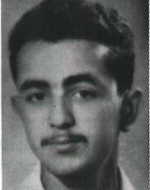Araki-Cohen, Shlomo
Son of Yehuda and Rivka. He was born on 28.8.1950 in Jerusalem. He began his studies at the Alliance School and after three years of study, his parents moved to Kiryat Yovel and then moved to the Gershon Agron School in the neighborhood. He was a quiet child and yet the teachers noted him as a lively student. He was a docile and diligent boy but did not stand out in class. Though disciplined, he always knew how to stand up. His Lev was not drawn to theoretical studies, and because he loved manual labor he refused to continue his studies. He began to study a profession in a factory in the city, but he aspired to study the profession not only in practice but also in theory, and when he was employed in manufacturing, he protested and insisted on his rights to study. He was a member of the Hanoar Haoved movement and several times complained to the Hanoar Haoved office that he was employed only in manufacturing jobs and on the day when he had to receive tenure at work – he was fired. So he tried his strength elsewhere, and because he did not like a variety of technical works, he went to work in his father’s factory, a metal factory. Shlomo had the soul of a craftsman and when he worked under the protection of his father, he refused to work near the machine that required constant sitting and almost robotic movement. He liked creating and could sit for hours on end near a still metal block and develop designs until he created something (such as a chandelier or lampshade). He was punctual and meticulous in his work, so he always produced a perfect work. Even though he worked hard during the day, he studied in the evenings at the Daat School and continued his studies until he finished. When the Six Day War broke out he called him an internal order to join the army. He felt that the time had come for him to fulfill his military duty. Shlomo joined the IDF at the end of January 1968 and was only 17 and five months old, and his parents did not object and did not stand in his way because there was no point in doing so. In fact, it was too late to join the Nahal Brigade, but nevertheless they sent him to the “Yaniv” nucleus, which began his service two months earlier at Kibbutz Afikim. During his army service, Shlomo continued to behave as usual, out of concern and love for his parents. He often wrote to them frequently and called to ask for their safety, even in the late hours of the night. On the other hand, he did not mention anything about what happened to him in the army so as not to frighten them. He would reassure them and did everything to ease their worries. When his mother asked him what his burns were, he did not tell her, but afterward she learned that he had been beaten when he risked himself to prevent a disaster that might have happened. On April 29, 1970, he fell in the area of the Suez Canal in an enemy bombing. He was laid to rest in the military cemetery on Mount Herzl in Jerusalem. After his fall, a booklet called “Shlomo” was published by Beth-Kefar-Gaza.
